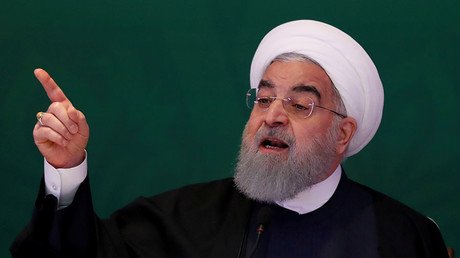British diplomats to use US Embassy in Jerusalem despite opposing relocation – report
The UK diplomats in Israel will do their business with Americans through the newly-inaugurated embassy in Jerusalem, a UK minister reportedly said. The UK snubbed the grand opening, voicing criticism over the move.
While being the US’ closest European ally, Britain joined the international community in boycotting the unveiling ceremony of the US Embassy in Jerusalem last week, which spurred violent clashes between Palestinian protesters and the Israeli army at the Gaza border. At least 60 people were killed in the altercation, including a baby that reportedly choked to death from tear gas, the Gaza Health Ministry said.
The protests, which left over 2,000 people injured, became the deadliest day in Gaza since 2014. The UK sided with the international outcry, calling on the Israeli forces to show restraint in quelling the unrest while denouncing the US decision. “We continue to believe that is playing the wrong card at the wrong time,” UK Foreign Secretary Boris Johnson said at the time.
However, it has now been revealed that what was seen as the UK’s bid to defy its main ally may have been short-lived. A mere three days later, UK Middle East Minister Alistair Burt reportedly told members of the British Palestinian Policy Council that the UK is not ready to go as far as to refuse visits to the US embassy altogether.
“When we asked him to confirm [that] UK officials would not attend meetings at the embassy going forward, as the UK does not recognize it, he was very clear that they would attend,” a source who was present at the meeting with Burt told the Middle East Eye.
Apart from the US, only two other countries, Guatemala and Paraguay, followed the US' lead and moved their embassies to Jerusalem, which Israel considers to be its “united and undivided” capital, a notion that has found no support from the international community. As with the majority of the countries, the UK backs the two-state solution in which Jerusalem is envisaged as a shared capital of the states of Israel and Palestine.
Controversy over the UK's plans to allow its diplomats to visit the US Embassy in Jerusalem is another ambiguous signal from London over the recent developments in the Palestinian-Israeli standoff. On Friday, the UK abstained from a UN Human Rights Council vote to launch a war crimes probe into the brutal crackdown on Palestinian protesters by Israel. Only two countries, the US and Australia, voted against the resolution. The decision was slammed by shadow foreign secretary Emily Thornberry, Labour Party, who said she was “disgusted” that the UK government did not support the independent investigation.
The way Britain went from standing up to the US to pandering to US President Donald Trump in just a few days screams of hypocrisy, Peter Ford, former UK ambassador to Syria, said. He rejected the argument that by maintaining contacts with the US Embassy in Jerusalem, the UK can have better leverage with Washington.
“I would personally totally reject that. I think it’s laughable, the idea that British diplomats in Tel Aviv by trotting up to meet American diplomats in Jerusalem can have any influence over that embassy which is in the stewardship of the American ambassador, who is very extreme, is laughable,” Ford said.
The former diplomat argued that things would be very different had it not been the US that moved its embassy, but Russia.
“Would the British position be to continue doing business with it? No way. There would have been horrified exclamations, legal arguments would have been found to justify Britain’s position of having nothing to do with this Russian embassy. It’s double standards.”
The UK's inability to back up its words with deeds further emboldens Trump and sets a dangerous precedent in light of the US exit from the Iran nuclear deal, he noted.
“It’s a missed opportunity. It makes it look like Trump is able to bully his way past the Europeans and that’s a very bad precedent in the context with Iran.”
















